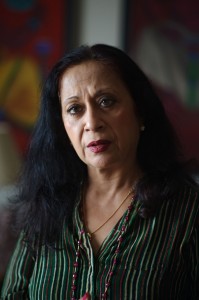India’s fascination with ‘foreign’ things
Tavleen Singh is an Indian columnist, political reporter and writer. Her latest book ‘Durbar’ is a memoir of her career as a journalist during the time Indira Gandhi and Rajiv Gandhi were the prime ministers of India. She gives us an insight into the workings of the world’s largest democracy through her travels and the people she met.
Roma Rajpal: What motivated you to write the book?
Tavleen Singh: If journalism is the first draft of history, as they say it is, then this is an obvious book to write for me as a journalist. I witnessed some important events in history and believe it was my responsibility as a journalist to make them a matter of record.
How much time did it take you to write the book?
The book took a long time to write because I started writing it many years ago and then gave up the idea. Then, when I went back to it I thoughtI would first write it as a novel but that did not work so in the end the book in its present form began to come together in my head and by the time I finished writing it more than two years passed.
The fascination with all things foreign is still very deeply engrained in the Indian society. Do you think India’s youth will ever get over this fascination?
Indians are fascinated with foreign things because foreigners ruled India for a very long time. They must have looked better than the natives in their methods and way of living and I think this could have created, in the Indian mind, a deep respect for foreigners with white skin. Foreigners who are not white-skinned usually have a bad time in India. As for young Indians and their fascination for foreign things I believe it could be because foreign technology is so impressive compared to our own. And, when I was young, growing up in ‘socialist’ India, most of the things produced in India were so shoddy and second-rate that a fascination with Western consumer goods became inevitable.
Is India’s youth still struggling to find its feet in the post-colonial environment?
India’s youth is, in my view, unaffected by the colonial period. The problem is that we have a colonial system of education that continues to teach young Indians a colonial curriculum. Indian school children are more familiar with Dickens and Shakespeare than with Ghalib and Manto because that is how they are taught to be by their schools. Luckily less than 5 percent of Indians speak English so they have not lost their languages yet, but this could be a danger in the future as even the poorest Indians these days try to send their children to English schools.
Does Hindi journalism still get step-treatment in India? If so why?
Hindi journalism is much more powerful than English journalism in India. Hindi has three of the largest circulation newspapers in the world. Dainik Jagran with a readership of 50 million, Dainik Bhaskar with 30 million and the newspaper I write a weekly column for, Amar Ujala, with 20 million. This is readership, not circulation but even circulation figures are much, much higher than the Times of India which is the largest English newspaper. On television, Hindi dominates English so much that English is barely relevant by comparison. But, it seems more powerful because of the number of policy makers who read English newspapers and watch English news channels.
What do you think needs to be done urgently for the situation of women in India in the light of the rape case?
The situation of women in India is complicated and will need a long, hard fight to resolve. But, when it comes to crimes against women, there are easier solutions if the criminal justice system could be put on a fast track. It is outrageous that there should be 95,000 rape cases still under trial in Indian courts. Some take decades to end or even come to trial. The real problem is the judicial system and the police.
There is general lack of political will among the officials in India. How could this be changed?
I don’t understand your question. Political will to do what? They have plenty of political will when it comes to pushing through measures that would give them direct benefits like higher salaries and constituency funds. Because of dynastic democracy a very self-serving kind of person comes into politics these days and that is a serious problem.
You are clearly against dynasty politics. What are the alternatives and how does the common man get persuaded to choose rather than simply going with the only thing he knows?
The common man has been excluded from entering politics because of dynasties that prevail right down to the panchayat level. If political parties were ordered by the Election Commission to have internal elections, like primaries in the United States, they would become more democratic and people with a real desire for public service would come into public life.
Interview: Roma Rajpal
Editor: Manasi Gopalakrishnan







